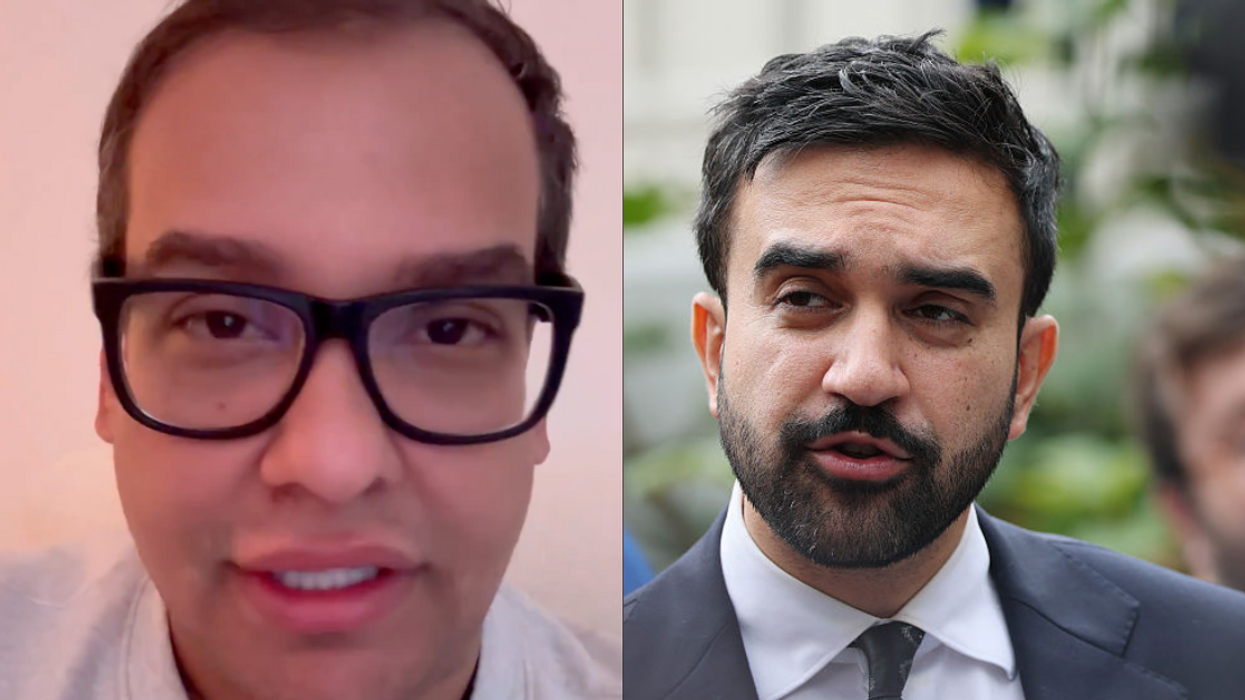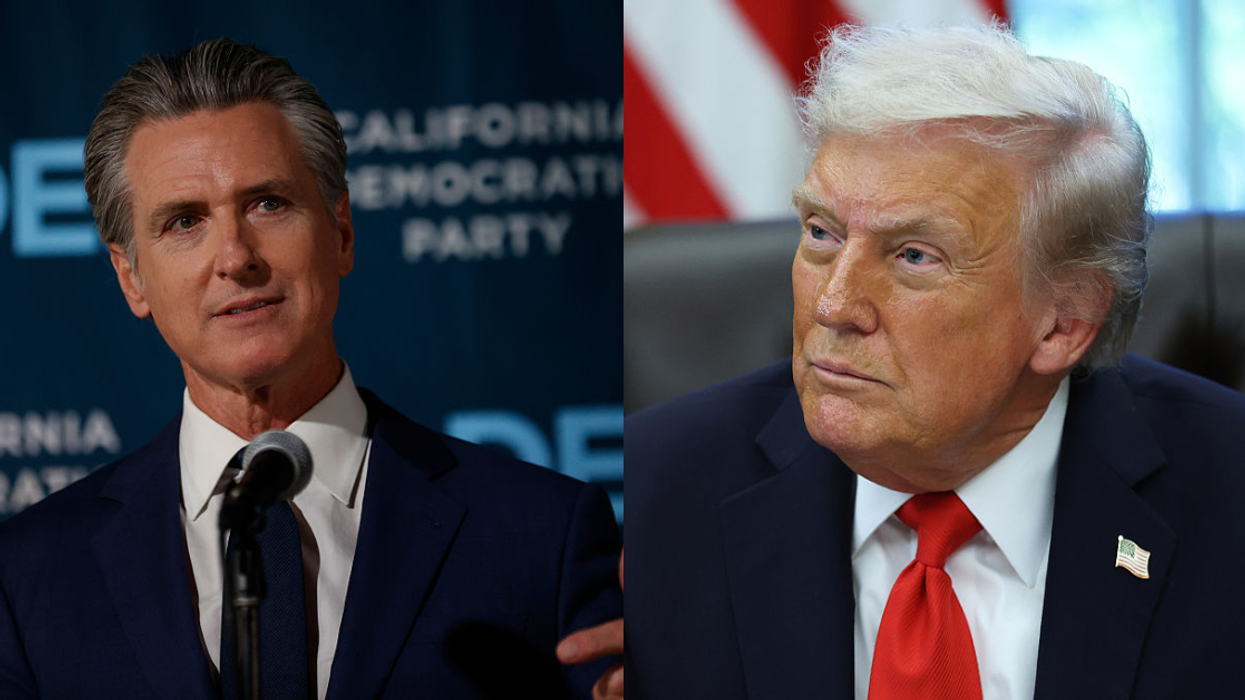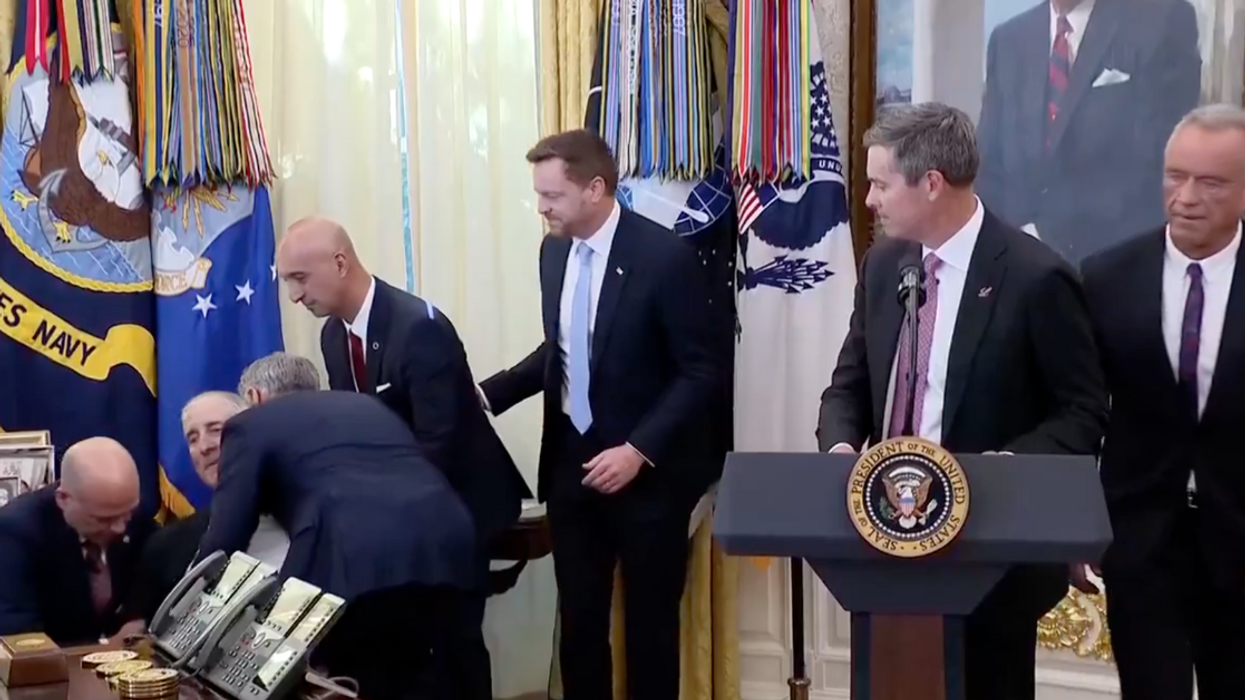The United States Department of Justice announced on Friday the indictments of twelve Russian intelligence operatives for their roles in hacking Democratic National Committee emails during the 2016 election cycle.
The indictments are the latest round of charges stemming from Special Counsel Robert Mueller's investigation into Russian meddling in the 2016 presidential election, signifying remarkably impressive cyber-detective work conducted by American and international intelligence agencies.
The White House wasted no time in firing back, claiming "this is consistent with what we've been saying all along."
There was one aspect of that response though that caught people's attention.
The President himself has been uncharacteristically quiet on the subject, although perhaps it's understandable:
But 2016 is not the only election people are concerned about in the wake of these indictments.
The New York Times' Maggie Haberman noted that stolen emails from the Democratic Congressional Campaign Committee "were not broadly released," fueling speculation that Russian election interference efforts may be ramping up in the four months before Americans head to the polls to determine which political party will control Congress.
These concerns were voiced by members of Congress last November as circumstantial evidence of Russian election meddling began to surface.
Notably, a bi-partisan effort to allocate $160 million to enhance the security of voting machines stalled in the Senate last fall.
“I’m concerned that there’s not enough urgency broadly to move legislation forward,” Senator Martin Heinrich (D-NM) told POLITICO. “But we’re going to keep pushing because I think these problems are not going away.”
“There’s no question from the standpoint of what we need to do, we’re behind,” said Representative Bennie Thompson (D-MS), who co-chairs an effort by House Democrats to enact protections on the nation's largely decentralized election infrastructure. “And by being behind, we’re at risk for any future federal election.”
Secretary of State Mike Pompeo warned in May of “continued efforts” by Russia to influence the outcome of American elections.
American intelligence agencies have unanimously concluded that the Russians conducted efforts to interfere in the 2016 election - a fact with which Senator Richard Burr (R-NC), co-chair of the Senate Intelligence Committee, agrees. Burr emphasized in May the Senate has spent more than a year “reviewing the sources, tradecraft, and analytic work, and we see no reason to dispute the conclusions.”
There are more than 20 elections set to be held in the United States and Europe between now and the presidential election in 2020, and experts worry Russian efforts to interfere may be too far along to be stopped.
"Worryingly, Western governments are still fighting the last war," Anders Rasmussen and George W. Bush Homeland Security Secretary Michael Chertoff wrote in Politico last month. "They’re stuck in the blunt 2016 lexis of “fake news,” while current trends indicate that Russia and similar adversaries are sharpening their toolkit."
So far, Mueller has filed more than 100 criminal charges, which include those against three companies, nearly 30 Russians, and three Trump campaign associates who have submitted guilty pleas.
Agents working on behalf of the GRU, the Russian state intelligence agency, "conducted large-scale
cyber operations to interfere with the 2016 US. presidential election," the indictments allege.
In or around 2016, the Russian Federation (“Russia”) operated a military intelligence
agency called the Main Intelligence Directorate of the General Staff (“GRU”). The GRU had
multiple units, including. Units 26165 and 74455, engaged in cyber operations that involved the
staged releases of documents stolen through computer intrusions. These units conducted largescale
cyber operations to interfere with the 2016 US. presidential election.
Deputy Attorney General Rod Rosenstein outlined additional allegations that Russian officials broke into one state's election board website and stole information on hundreds of thousands of voters.
"Russian GRU officers hacked the website of a state election board and stole information about 500,000 voters," Rosenstein said at a press conference Friday afternoon. "They also hacked into computers of a company that supplied software used to verify voter registration information."
Rosenstein also told reporters he informed President Donald Trump of the evidence obtained by the Justice Department as well as their intent to indict Russian nationals for their role in election interference.
"I briefed President Trump on the allegations earlier this week," the DAG said. "The president is fully aware of the department's actions today."
Rosenstein also swiped at partisan bickering over the integrity of the Russia probe. "We do not try cases on television or in Congressional hearings," the DAG said in his remarks.
Republicans, with the president at the helm, have been attempting to undermine the investigation and sway public opinion against Mueller and his team of prosecutors.
Trump said on Friday U.S.-Russian relations have been "hurt very badly" due to the "rigged witch hunt."
On Wednesday, presumably after being informed by Rosenstein of the coming indictments of Russian nationals, the president referred to Mueller's investigation as a "rigged witch hunt."
Trump is scheduled to hold a summit with Russian President Vladimir Putin in Helsinki, Finland on Monday, with only translators present. No written record of the meeting will be transcribed.
Sources close to the president within the administration have said the Trump-Putin meeting is similar to the closed-door talk the president held with North Korean dictator Kim Jong Un in Singapore last month.
But Trump's willingness to take Putin's word that Russia didn't attempt to affect the outcome of the 2016 presidential race has American allies shaking.
Trump tweeted last month: "Russia continues to say they had nothing to do with Meddling in our Election!"
Last week, CNN national security analyst and historian Max Boot said: "The Europeans are petrified that he is going to sell them out and he is going to recognize the illegal annexation of Crimea."
Trump blamed President Barack Obama for Russia's actions and has hinted he may cede recognition of Russia's annexation of Crimea to Putin.
Nevertheless, Trump indicated he will broach the subject of election interference with Putin, though he did not say he would challenge any denial from the Russian president.
"Look, he may. What am I going to do? He may deny it,” Trump said at a press conference during his NATO visit in Brussels on Thursday. “All I can do is say, ‘Did you?’ And, ‘Don’t do it again.’ But he may deny it. You’ll be the first to know.”














 breast cancer GIF by Baptist Health South Florida
breast cancer GIF by Baptist Health South Florida  Teddy Bear Doctor GIF
Teddy Bear Doctor GIF  feeling neck skin GIF
feeling neck skin GIF  praying GIF
praying GIF 
 Snail Ugh GIF by Sticker Book iOS GIFs
Snail Ugh GIF by Sticker Book iOS GIFs  Serious
Serious  Home Alone Reaction GIF by 20th Century Fox Home Entertainment
Home Alone Reaction GIF by 20th Century Fox Home Entertainment  Cat Working GIF
Cat Working GIF